|
|
|
Sort Order |
|
|
|
Items / Page
|
|
|
|
|
|
|
| Srl | Item |
| 1 |
ID:
037953
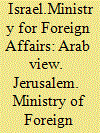

|
|
Arab view
/ Israel.Ministry for Foreign Affairs
|
1973

|
|
|
|
| Publication |
Jerusalem, Ministry of Foreign Affairs Research Division, 1973.
|
| Description |
239p.pbk
|
|
|
|
|
|
|
|
|
|
|
|
Copies: C:1/I:0,R:0,Q:0
Circulation
| Accession# | Call# | Current Location | Status | Policy | Location |
| 015128 | 956.048/ISR 015128 | Main | On Shelf | General | |
|
|
|
|
| 2 |
ID:
129803


|
|
|
|
|
| Publication |
2014.
|
| Summary/Abstract |
Looking primarily at the Israeli side of the conflict, one sees many factors that have contributed to the failure of past peace efforts, most of which may be present or repeated in current (2014) and possibly future - attempts at peace making.
|
|
|
|
|
|
|
|
|
|
|
|
|
|
|
|
| 3 |
ID:
126974
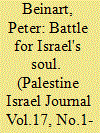

|
|
|
|
|
| Publication |
2011.
|
| Summary/Abstract |
Israeli activists must connect with young, secular American Jews through a liberal Zionism that allows for criticism of Israeli policy. Peter Beinart is senior political writer at the blog The Daily Beast, associate professor of journalism and political science at the City University of New York and a Schwartz Senior Fellow at the New America Foundation. This article is based on his keynote address to the New Israel Fund conference in Tel Aviv-Jaffa held on June 28, 2010 under the heading `The Only Democracy in the Middle East? A Battle for Israel ~ Soul
|
|
|
|
|
|
|
|
|
|
|
|
|
|
|
|
| 4 |
ID:
133305
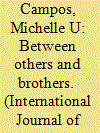

|
|
|
|
|
| Publication |
2014.
|
| Summary/Abstract |
Some fifteen years ago, the Israel Museum exhibition "To the East: Orientalism in the Arts in Israel" featured a photograph by the Israeli artist Meir Gal entitled "Nine Out of Four Hundred: The West and the Rest." At the center of the photograph was Gal, holding the nine pages that dealt with the history of Jews in the Middle East in a textbook of Jewish history used in Israel's education system. As Gal viscerally argued, "these books helped establish a consciousness that the history of the Jewish people took place in Eastern Europe and that Mizrahim have no history worthy of remembering." More damningly, he wrote that "the advent of Zionism and the establishment of the Israeli State drove a wedge between Mizrahim and their origins, and replaced their Jewish-Arab identity with a new Israeli identity based on European ideals as well as hatred of the Arab world."
|
|
|
|
|
|
|
|
|
|
|
|
|
|
|
|
| 5 |
ID:
131518
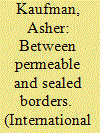

|
|
|
|
|
| Publication |
2014.
|
| Summary/Abstract |
The Trans-Arabian Pipeline (Tapline), which extended from Dhahran in Saudi Arabia to Zahrani in Lebanon and operated from 1950 to 1982, was haunted by the Arab-Israeli conflict throughout the years of its operation. The route of the pipeline-which traversed Saudi Arabia, Jordan, Syria, and Lebanon-was chosen so as to circumvent Palestine/Israel. However, following the Israeli occupation of the Golan Heights in the 1967 war, Israel became an active participant in this project, with the full consent of the transit states and Egypt. This article uses Tapline as a means to analyze the interconnected world facilitated by oil pipelines, which defies common wisdom about state sovereignty or the function of interstate boundaries. In addition, Tapline demonstrates how this interconnected network created possibilities for Arab-Israeli cooperation that might have seemed inconceivable initially, given the hostile dynamics of the conflict.
|
|
|
|
|
|
|
|
|
|
|
|
|
|
|
|
| 6 |
ID:
129799
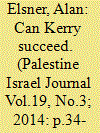

|
|
|
|
|
| Publication |
2014.
|
| Summary/Abstract |
During the many years of US Diplomacy in the Middle East, it has become a cliché to state that the United States cannot want peace more than the Israelis and Palestinians themselves.
|
|
|
|
|
|
|
|
|
|
|
|
|
|
|
|
| 7 |
ID:
129801
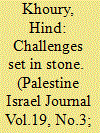

|
|
|
|
|
| Publication |
2014.
|
| Summary/Abstract |
What are the challenges to peace in 2014? The date is worth emphasizing, since attempts to broker peace in the Middle East are anything but new. In fact, the 1979 David Accords with Egypt are already 35 year old, and the Israeli-Palestinian peace process in entering its 23rd year. The process is growing stronger, but genuine peace is weakening by the day. In the meantime, there have been countless studies, articles, books, maps and reports addressing all aspects in the conflicts.
|
|
|
|
|
|
|
|
|
|
|
|
|
|
|
|
| 8 |
ID:
027216
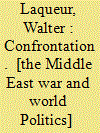

|
|
|
|
|
| Publication |
London, Wildwood House., 1974.
|
| Description |
vii, 245p.hbk
|
| Standard Number |
0704500965
|
|
|
|
|
|
|
|
|
|
|
|
Copies: C:1/I:0,R:0,Q:0
Circulation
| Accession# | Call# | Current Location | Status | Policy | Location |
| 013697 | 956.04/LAQ 013697 | Main | On Shelf | General | |
|
|
|
|
| 9 |
ID:
126905
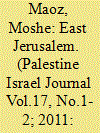

|
|
|
|
|
| Publication |
2011.
|
| Summary/Abstract |
The creation of a Palestinian state with East Jerusalem as its capital is a key step in mending relations between Israel and the Arab and Islamic worlds
|
|
|
|
|
|
|
|
|
|
|
|
|
|
|
|
| 10 |
ID:
126874
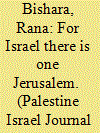

|
|
|
|
|
| Publication |
2011.
|
| Summary/Abstract |
The article presents the author's views regarding Judaization issue in Jerusalem. The author denotes the Israeli government's aim for the improvement of the tourism industry. The author cites the settlement condition of several Palestinian Arabs to the government's goal, where they will be forced to evict from the place where they have settled. Moreover, the author also mentions the political issue on Judaization.
|
|
|
|
|
|
|
|
|
|
|
|
|
|
|
|
| 11 |
ID:
132309
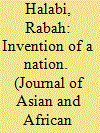

|
|
|
|
|
| Publication |
2014.
|
| Summary/Abstract |
Ethnic and national identities are shaped and evolve in the context of complex negotiations sustained among multiple players, each with its own and often contradicting interests. This study focuses on one unique cultural group, the Druze in Israel, and examines a multifaceted identity constructed as a direct result of policies and expectations of members and institutions of majority groups. My aim is to explore how this identity is defined within the complex intergroup context, the various components and their inter-relations (congruent or conflictual), and the way its boundaries are shaped through interaction with other identities in Israel. The analysis of the interviews conducted with 50 Druze university students in Israel yielded three major content categories: 'Druze by blood;' 'Arab, but less so;' and 'Being Israeli.' The Druze identity is constructed in primordialist terms, and a central role is assigned to the belief in reincarnation. The Arab identity is categorized primarily as a national one, and it is strongly affected by the negative attitude of Arabs toward the service of the Druze in the Israeli army. Three major aspects emerged in relation to the Israeli identity of the Druze: the fact of their being citizens of the State of Israel, the attitude of the state and of Jews toward them, and the army service. Our study portrays a highly complex and problematic constellation of group identities, shaped as a delicate adaptation to the unique position of a group subject to multiple political forces in the past and present.
|
|
|
|
|
|
|
|
|
|
|
|
|
|
|
|
| 12 |
ID:
131873
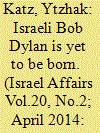

|
|
|
|
|
| Publication |
2014.
|
| Summary/Abstract |
This article examines the protest movement of the younger generation of Israeli songwriters and performers that emerged in response to the vicissitudes of the Arab-Israeli conflict over the past decades, notably the 1982 Lebanon war, the outbreak of the Palestinian intifada (December 1987), and Israel's unilateral disengagement from Gaza (2005). It argues that while this movement succeeded in inserting itself into the cultural and public arenas and shaking some of the unwavering beliefs and convictions held by the 'founding generation', its overall impact has remained limited.
|
|
|
|
|
|
|
|
|
|
|
|
|
|
|
|
| 13 |
ID:
134177
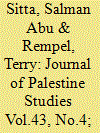

|
|
|
|
|
| Publication |
2014.
|
| Summary/Abstract |
The internment of thousands of Palestinian civilians in Israeli-run prisoner of war camps is a relatively little known episode in the 1948 war. This article begins to piece together the story from the dual perspective of the former civilian internees and of the International Committee of the Red Cross (ICRC). Aside from the day-to-day treatment of the internees, ICRC reports focused on the legal and humanitarian implications of civilian internment and on Israel's resort to forced labor to support its war effort. Most of the 5,000 or so Palestinian civilians held in four official camps were reduced to conditions described by one ICRC official as "slavery" and then expelled from the country at the end of the war. Notwithstanding their shortcoming, the ICRC records constitute an important contribution to the story of these prisoners and also expose the organization's ineffectiveness-absent a legal framework as well as enforcement mechanisms beyond moral persuasion, the ICRC could do little to intervene on behalf of the internees.
|
|
|
|
|
|
|
|
|
|
|
|
|
|
|
|
| 14 |
ID:
132316
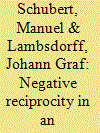

|
|
|
|
|
| Publication |
2014.
|
| Summary/Abstract |
How is negative reciprocity cultivated in an environment of violent conflict? This study investigates how students in the West Bank react to unfair proposals in an ultimatum game. Proposals submitted with Hebrew as compared to Arab handwriting are rejected more often. Israelis must offer 15 percent more of a given stake than Palestinians in order to achieve the same probability of acceptance. This willingness to lose money by rejecting proposals reveals a preference for discrimination against Israelis, cultivated in the conflict-ridden environment. Students who voice a militant attitude, surprisingly, do not reveal a higher tendency to discriminate, exercising a high degree of negative reciprocity toward all unfair proposals. But those who favor a political role for Islam have a higher inclination to discriminate. This implies that ethnic and religious cleavages do not consistently generate in-group solidarity.
|
|
|
|
|
|
|
|
|
|
|
|
|
|
|
|
| 15 |
ID:
134178
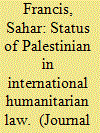

|
|
|
|
|
| Publication |
2014.
|
| Summary/Abstract |
This essay addresses the legal status of Palestinian political prisoners under international humanitarian and human rights law. At the heart of this issue lies the fundamental question of Israel's right to arrest hundreds of thousands of Palestinians, put them on trial before arbitrary military courts, and treat them as criminals in its capacity as the occupying power given the internationally-recognized right of Palestinians to resist occupation and pursue self-determination. This question takes on all the more urgency considering the illegal nature of the Israeli occupation1 and given that the laws and rules of war are applicable to Palestinian detainees as their status conforms to the definition of prisoners of war and civilians under occupation pursuant to the Geneva Conventions of 1949.
|
|
|
|
|
|
|
|
|
|
|
|
|
|
|
|
| 16 |
ID:
133307
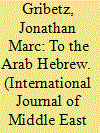

|
|
|
|
|
| Publication |
2014.
|
| Summary/Abstract |
To the Arab Hebrew [la-?ivriyah ha-?arviyah]! If you are a Hebrew, you are not an Arab. If an Arab, not a Hebrew. So, you are neither a Hebrew nor an Arab . . . C.Q.F.D." This paid announcement, published by an anonymous reader of the Jerusalem-based Hebrew newspaper ha-Tsevi on 27 November 1908, reminds us that the idea of an Arab Jew (or, in the parlance of Palestinian Hebrew in the early 20th century, an Arab Hebrew) has been at once present and contested from the early years of Zionist settlement in Palestine. Moreover, the contestation was (as it remains) often more emotional than logical (ce qu'il fallait démontrer notwithstanding). But the category of Arab Hebrew was not constructed simply to be attacked; for some, including another personal advertiser on the very same page of ha-Tsevi, Arab Hebrew was a self-proclaimed identity. "To M. M.," he or she wrote, "I saw you, I knew you, I respected you. I will leave you, I will remember you, and I will not forget you." This mysterious
|
|
|
|
|
|
|
|
|
|
|
|
|
|
|
|
|
|
|
|
|